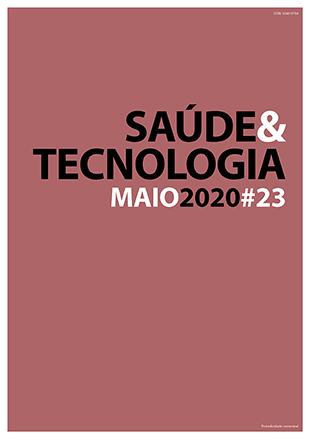Tensões e desafios da eticidade da investigação científica em saúde: uma reflexão em aberto
DOI:
https://doi.org/10.25758/set.2264Palavras-chave:
Regulação ética, Investigação em saúde, Ciências sociais, Integridade científicaResumo
Ética e investigação constituem-se como dimensões que são cada vez mais interdependentes, pelo que o amplo debate em torno da promoção de uma cultura ética de rigor e de exigente escrutínio corresponde a uma preocupação que é efetivamente transversal a todas as áreas do conhecimento científico. Com este artigo de reflexão teórica pretende-se sinalizar as características e as tendências subjacentes à evolução da regulação ética na investigação científica, mas também proceder a alguns questionamentos críticos em termos das implicações, tensões e desafios que esta realidade comporta. Se, por um lado, se percebe bem a solicitação de formas mais robustas de salvaguarda da integridade científica e da credibilidade da investigação, por outro lado, não deixa também de ser notória a emergência de uma certa tentação do estreitamento da conceção da investigação, no sentido em que o reforço da regulação pode comportar o risco de alguma burocratização e de normalização do escrutínio ético. O desafio para a regulação ética passa por conseguir estabelecer formas de deliberação mais exigentes e melhor adaptadas às novas dinâmicas da investigação científica, mas sem incorrer necessariamente na obstaculização da investigação inovadora ou no estabelecimento de procedimentos de regulação uniformizados que podem, por conseguinte, ser desajustados face à realidade de tradições científicas distintas da investigação clínica e biomédica.
Downloads
Referências
Bülow W, Helgesson G. Criminalization of scientific misconduct. Med Health Care Philos. 2019;22(2):245-52.
All European Academies [ALLEA]. Código Europeu de conduta para a integridade da investigação [Internet]. Berlim: ALLEA; 2018. Available from: https://www.allea.org/wp-content/uploads/2018/11/ALLEA-European-Code-of-Conduct-for-Research-Integrity-2017-Digital_PT.pdf
Cascais AF. Genealogia, âmbito e objecto da bioética. In: Silva JR, Barbosa A, Vale FM, editors. Contributos para a bioética em Portugal. Lisboa: Cosmos; 2002. p. 47-136. ISBN 9789727622382
Cascais AF. Comentário: a bioética, ou a crise das regulações. O que é dado à sociologia saber/fazer? In: Carapinheiro G, Correia T, editors. Novos temas de saúde, novas questões sociais. Lisboa: Mundos Sociais; 2015. p. 31-8. ISBN 9789898536440
Carvalho T, Correia T, Serra H. Professions under suspicion: what role for professional ethics and commitment in contemporary societies [guest editorial]. Sociol Probl Prat. 2018;(88):9-25.
Power M. The audit society: rituals of verification. Oxford: Oxford University Press; 1999. ISBN 9780198296034
Raposo H. Apreciação ética de projectos de investigação em saúde: uma reflexão situada a propósito da ética de investigação em ciências sociais [Ethical appraisal of health research projects: A situated reflection on the ethics of research in the social sciences]. Sociol Online. 2016;(12):22-48. Portuguese
Fleischer S, Schuch P, editors. Ética e regulamentação na pesquisa antropológica. Brasília: Letras Livres, Editora Universidade de Brasília; 2010. ISBN 9788598070247
White J, Fitzgerald T. Researcher tales and research ethics: the spaces in which we find ourselves. Int J Res Method Educ. 2010;33(3):273-85.
Neves MP. As comissões de ética hospitalares e a institucionalização da bioética em Portugal [The hospital ethics committees and the institutionalization of bioethics in Portugal]. Rev Bioética. 1995;3(1). Portuguese
Lourenço I. Comissões de ética no ensino superior: primar pela integridade científica, uma necessidade do séc. XXI. IPCB Campus: rev Inst Polit Castelo Branco. 2018;8(13):12-5.
Oliveira L. Desafios à universidade: comercialização da ciência e recomposição dos saberes académicos. Sociol Probl Prat. 2000;(34):93-116.
Rubião A. História da universidade: genealogia para um “modelo participativo”. Coimbra: Almedina; 2013. ISBN 9789724051789
Garcia JL, Martins H. O ethos da ciência e as suas transformações contemporâneas, com especial atenção sobre a biotecnologia. In: Villaverde-Cabral M, Wall K, Aboim S, Silva FC, editors. Itinerários: a investigação nos 25 anos do ICS. Lisboa: Imprensa de Ciências Sociais; 2008. p. 397-417. ISBN 9789726712244
Patrício MT, Conceição CP, editors. Redes e colaborações científicas: os programas de parcerias internacionais em Portugal. Lisboa: Mundos Sociais; 2015. ISBN 9789898536501
Howick J. The philosophy of evidence-based medicine. Chichester: Wiley-Blackwell; 2011. ISBN 9781405196673
Hammersley M. Creeping ethical regulation and the strangling of research. Sociol Res Online. 2010;15(4):123-5.
Derbyshire S. The ethical dilemma of ethical committees. Sociol Compass. 2008;2(5):1506-22.
Hoeyer K, Dahlager L, Lynöe N. Conflicting notions of research ethics: the mutually challenging traditions of social scientists and medical researchers. Soc Sci Med. 2005;61(8):1741-9.
Guerriero IC, Minayo MC. O desafio de revisar aspectos éticos das pesquisas em ciências sociais e humanas: a necessidade de diretrizes específicas [The challenge of reviewing ethical aspects of social and human research: the need for specific guidelines]. Physis Rev Saúde Colet. 2013;23(3):763-82. Portuguese
Downloads
Publicado
Edição
Secção
Licença
Direitos de Autor (c) 2022 Saúde & Tecnologia

Este trabalho encontra-se publicado com a Licença Internacional Creative Commons Atribuição-NãoComercial-SemDerivações 4.0.
A revista Saúde & Tecnologia oferece acesso livre imediato ao seu conteúdo, seguindo o princípio de que disponibilizar gratuitamente o conhecimento científico ao público proporciona maior democratização mundial do conhecimento.
A revista Saúde & Tecnologia não cobra, aos autores, taxas referentes à submissão nem ao processamento de artigos (APC).
Todos os conteúdos estão licenciados de acordo com uma licença Creative Commons CC-BY-NC-ND. Os autores têm direito a: reproduzir o seu trabalho em suporte físico ou digital para uso pessoal, profissional ou para ensino, mas não para uso comercial (incluindo venda do direito a aceder ao artigo); depositar no seu sítio da internet, da sua instituição ou num repositório uma cópia exata em formato eletrónico do artigo publicado pela Saúde & Tecnologia, desde que seja feita referência à sua publicação na Saúde & Tecnologia e o seu conteúdo (incluindo símbolos que identifiquem a revista) não seja alterado; publicar em livro de que sejam autores ou editores o conteúdo total ou parcial do manuscrito, desde que seja feita referência à sua publicação na Saúde & Tecnologia.







